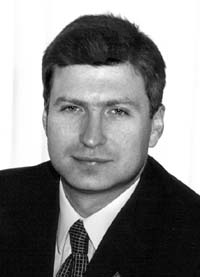Philanthropist Bohdan Hubsky Wants Ukraine to Have What is Ukrainian

The Ukrainian Hetmanate fell into decay after Bohdan Khmelnytsky’s death because the Cossack starshyna held their own interests above national ones, says Bohdan Hubsky, chairman of the Twentieth-First Century Ukraine Foundation for Intellectual Cooperation. Lest we repeat our ancestors’ sad experience, he believes, we must mobilize the nation’s intellect. From this flows the fund’s emphasis on the preparation and holding of an intellectual forum of Ukraine, expected to attract scientists, people working in education, people of the arts, even servicemen to work out constructive proposals relating to economic and social transformations. The forum is scheduled for mid- December. In addition to working out the forum’s concept, the fund’s board at a November 13 meeting summed up its performance in the past two years. One of the fund’s first initiatives, meeting with a broad public response, was the institution of the Volodymyr Vernadsky Prize, currently boasting 31 laureates, among them academicians, film directors Kira Muratova and Roman Balayan, artist Volodymyr Chepelyk, singer Nina Matviyenko, violinist Bohodar Kotorovych, and three foreigners: Roman Szporluk of Harvard University, Oleksandr Rudenko-Desniak, president of the Ukrainian-Russian Association, and Russian Academician Zhores Alfiorov. Sixteen prominent scholars and cultural figures have been awarded lifelong scholarships. Also, serious attention is being paid to the search for and sponsorship of young talent. Some 300 graduates of secondary schools, winners of the Ukrainian Student Games called Twenty- First Century Intellectual received the fund’s grants for tuition at the nation’s institutes of higher education, along with monthly stipends. Mr. Hubsky, however, admits to a problem still unsolved: college/university graduates’ employment, so as to curb their outflow from Ukraine and help them find jobs in line with their qualifications. Last year, rectors and managers of leading research centers as potential employers held a conference with students, but the fund’s initiative, developing the higher education domestic production working model, was put off until a later date.
In contrast, the unique project of returning Bohdan Khmelnytsky’s personal effects to Ukraine may well come to fruition (e.g., those stored in Swedish, Polish, and Russian museums). An interesting fact is that those wishing to be photographed in front of the Ukrainian hetman’s standard at the Swedish museum must receive the queen’s permission, applying for it two months in advance. When the fund organized an exhibit of Khmelnytsky’s attributes of office in Ukraine, the arrangements were made in only three days. The preliminary talks on the return of the hetman’s relics were positive for the Ukrainian side, and now the technical aspects remain to be agreed upon: precisely what Ukraine can offer foreign historians in return.
As requested by academicians, writers, and cultural figures, the fund will in the next couple of years concentrate on practically all spheres of public life in Ukraine. In other words, more intensive efforts will be made to support men of the arts, young scientists, and domestic publishing. As for the latter, writer Yury Mushketyk says the initiatives are still sporadic; the fund’s experience and The Day’s project (e.g., Ukraine Incognita based on the newspaper’s historical publications) should be united on the basis of a single publishing corporation.
The Editors, of course, appreciate Mr. Mushketyk’s support, but this newspaper is against such giant projects and prefers to deal with individual publishers and philanthropists. Overstated as they are, the ambitions of domestic scholars and cultural figures can be understood. National Academy President Borys Paton noted that the relationships between the scientific-cultural sphere and the state are, to put it mildly, paradoxical; while being proclaimed national development strategic priorities, they are in no way supported by the state. The state owes UAH 50 million to the National Academy of Sciences alone.






